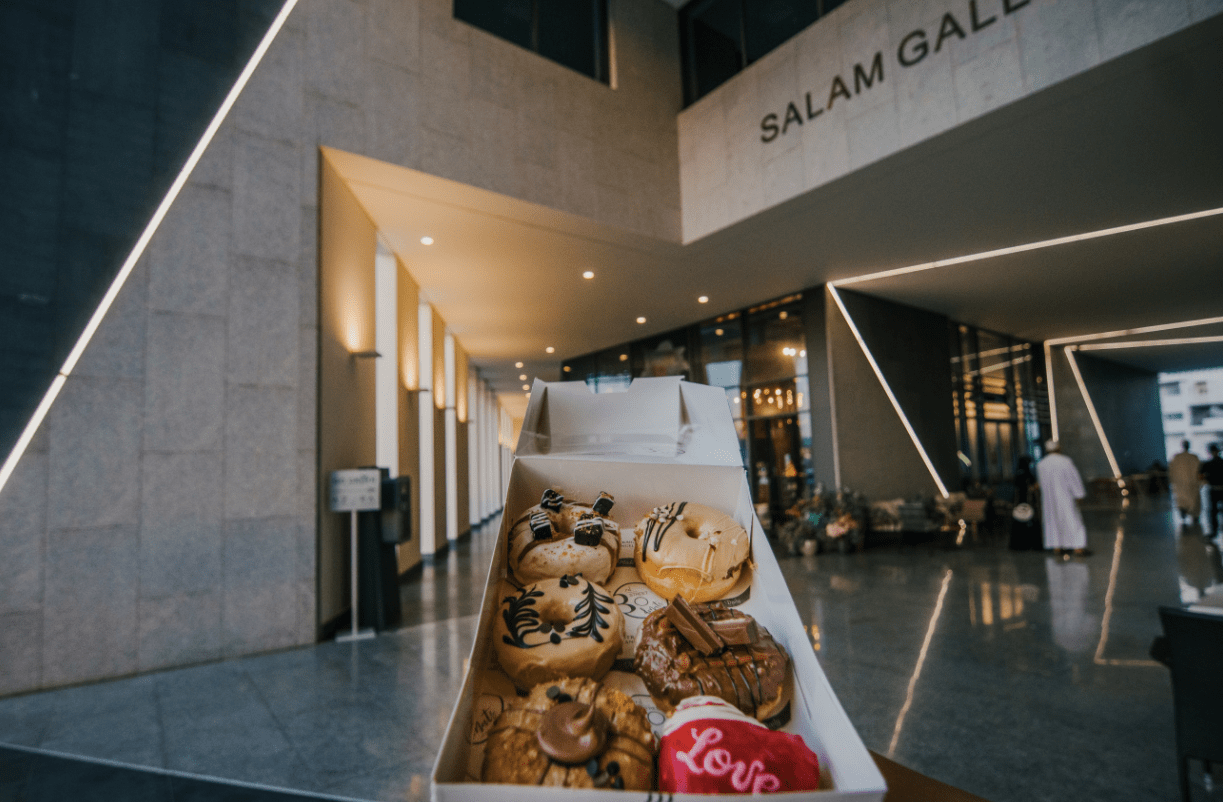Lifestyle
Los Angeles Dessert Innovation Takes Over The Middle East (And The Rest of The World) at 3rd Street Donuts Shop

If you’re ever catching yourself asking where you can find a piece of America in the Middle East, look no further. 3rd Street Donuts is where you can find a list of over a dozen specialty coffees and a one-of-a-kind, secret donut recipe that is directly imported from one of the finest American bakeries in Los Angeles, California.
The shop carries over 120 flavors of donuts, rotating from 40 to 50 flavors a day. They are made fresh daily and decorated beautifully in-house with a wide variety of colorful toppings for every occasion. The shop also offers a wide variety of artisanal hot and iced coffees that resemble those at your typical American coffee shop.
Mundhir al Alawi, founder and owner of 3rd Street Donuts, visited local, family-owned donut shops practically everyday while living in Los Angeles, California. He quickly fell in love with the dessert and the many distinct ways it could be prepared, depending on its unique recipe. Needless to say it didn’t take long for his newfound love of the fluffy treat to trigger the idea of a potential business endeavor.
But in order to remain as authentic as possible to his favorite donut shops in L.A, Alawi knew he’d have to create an American-style donut recipe for his small business. He proceeded to hire an executive pastry chef, and, in collaboration with an American bakery, designed the perfect donut recipe that would later become the secret signature staple of 3rd Street Donut Shop.
Thanks to the Free Trade Agreement between the United States and Oman, the shop’s top-quality ingredients for its secret recipe are imported from California whilst remaining completely duty-free. Since the innovative recipe requires special ingredients from both countries in order for the dessert to remain perfectly soft and fluffy, fellow competitors in the area using local ingredients have tended to fall short in competition.
There are currently three 3rd Street Donut Shop branches in Oman and more to come within the following year. By the end of 2021, the shop will be making its way into Saudi Arabia, Qatar, Dubai, and Bahrain. The business has also recently started accepting franchising applications which can be found on www.3sdonuts.com.
And if a delicious secret donut recipe imported overseas isn’t enough to bring you into the shop, its excellent customer service will do the trick. The shop’s owner made sure to put the customer’s experience at the forefront of his business by training staff to provide both innovative products and a wonderful dine-in experience. Each 3rd Street consumer is meant to be a friend and a lifetime companion of the business. “We are innovative in everything we do, but we always make sure to put the customer first,” owner and founder Mundhir al Alawi explains. “It’s always about making them feel like 3rd Street Donuts is a part of their home, and that whenever they walk into our shop, they understand that they are the most important.”
Join the 38,000+ members of 3rd Street Donuts’ digital family by following @3sdonuts on Instagram and follow their journey on their new locations coming soon. For more information on business opportunities, visit their website.
Lifestyle
When Seasons Shift: Dr. Leeshe Grimes on Grief, Loneliness, and Finding Light Again

Some emotional storms arrive without warning. A sudden change in weather, a holiday approaching, or even a bright sunny day can stir feelings that don’t match the world outside. For many people, the hardest seasons are not defined by temperature; they are defined by what’s happening inside, where grief and loneliness often move quietly.
This is the emotional terrain where Dr. Leeshe Grimes has spent her career doing some of her most meaningful work. As a psychotherapist, registered play therapist, retired U.S. Army combat veteran, and founder of Elevated Minds in the DMV area, she understands how deeply seasonal shifts and unresolved grief can affect people. Her upcoming books explore this very space, guiding readers through the emotional weight that can appear during different times of the year.
What sets Dr. Grimes apart is her ability to see clearly what many people overlook. Seasonal depression, for example, is usually tied to winter months. But she often sees it appear during warm, bright seasons, the times when the world seems happiest. For someone already grieving or feeling disconnected, watching others travel, celebrate, or gather can create its own kind of heaviness. Sunshine doesn’t always lift the mood; sometimes it highlights what feels missing.
The same misunderstanding surrounds grief. Society often treats it as a short-term experience with predictable phases and a clean ending. But in her practice, Dr. Grimes sees how grief keeps evolving. It doesn’t disappear on a timeline. It weaves itself into routines, memories, and milestones. People learn to carry it differently, but they rarely leave it behind completely. And that’s not failure, it’s human.
Her approach to mental health centers on truth rather than pressure. She encourages clients to acknowledge the emotions they try to hide: sadness that lingers longer than expected, moments of joy that feel out of place, and the waves of loneliness that return even when life seems stable. Instead of pushing for quick recovery, she focuses on helping people understand how emotions shift and how to care for themselves through those changes.
Much of her insight comes from her military years, where she witnessed the emotional toll of loss, transition, and constant survival. She saw how people continued functioning while carrying pain that had nowhere to go. That experience shaped her belief that healing requires space, space to feel, to speak, and to move through emotions without judgment.
In her clinical work today at Elevated Minds, she encourages people to build small, steady habits that anchor them during difficult seasons. Journaling helps them recognize patterns and name what feels heavy. Community support breaks the cycle of isolation. Therapy creates a place where emotions don’t have to be minimized or explained away. And intentional routines, daily sunlight, mindful breaks, and calm evenings help rebuild emotional balance.
Her upcoming books expand on these ideas, offering practical guidance for navigating both grief and seasonal depression. She focuses on helping readers understand that healing is not about escaping pain. It’s about learning how to live with it in a healthier way, honoring memories, acknowledging loneliness, and still allowing room for moments of light.
What makes Dr. Leeshe Grimes a compelling voice in mental health is her ability to bring language to experiences that many struggle to explain. She reminds people that emotional seasons don’t always match the weather and that there is no single path through grief. But within those shifts, she believes there is always a way forward.
The seasons will continue to change. And with the right tools, compassion, and support, people can change with them, finding steadiness, softness, and light again, one step at a time.
-

 Tech5 years ago
Tech5 years agoEffuel Reviews (2021) – Effuel ECO OBD2 Saves Fuel, and Reduce Gas Cost? Effuel Customer Reviews
-

 Tech6 years ago
Tech6 years agoBosch Power Tools India Launches ‘Cordless Matlab Bosch’ Campaign to Demonstrate the Power of Cordless
-

 Lifestyle7 years ago
Lifestyle7 years agoCatholic Cases App brings Church’s Moral Teachings to Androids and iPhones
-

 Lifestyle5 years ago
Lifestyle5 years agoEast Side Hype x Billionaire Boys Club. Hottest New Streetwear Releases in Utah.
-

 Tech7 years ago
Tech7 years agoCloud Buyers & Investors to Profit in the Future
-

 Lifestyle5 years ago
Lifestyle5 years agoThe Midas of Cosmetic Dermatology: Dr. Simon Ourian
-

 Health7 years ago
Health7 years agoCBDistillery Review: Is it a scam?
-

 Entertainment7 years ago
Entertainment7 years agoAvengers Endgame now Available on 123Movies for Download & Streaming for Free
